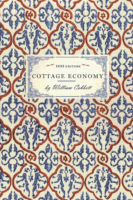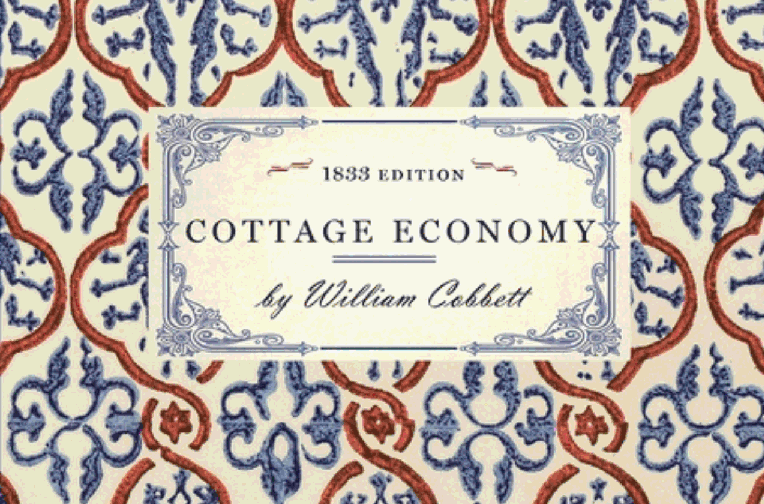 By chance I recently acquired a copy of William Cobbett’s (1763–1835) classic text of self-sufficiency, Cottage Economy. Originally published as a series of pamphlets in 1821 and still widely available today, Cottage Economy was intended as a practical guide for the independent smallholder seeking to live sustainably from the land. It resembles a kind of homesteading encyclopaedia, providing information on everything a stout yeoman could need to maintain his family on less than an acre of land. From raising poultry to building ice houses, brewing ale to weaving bonnets — Cobbett covers it all.
By chance I recently acquired a copy of William Cobbett’s (1763–1835) classic text of self-sufficiency, Cottage Economy. Originally published as a series of pamphlets in 1821 and still widely available today, Cottage Economy was intended as a practical guide for the independent smallholder seeking to live sustainably from the land. It resembles a kind of homesteading encyclopaedia, providing information on everything a stout yeoman could need to maintain his family on less than an acre of land. From raising poultry to building ice houses, brewing ale to weaving bonnets — Cobbett covers it all.
Cottage Economy is not, however, just a nineteenth-century DIY manual. It is also a fiercely polemical defence of smallholding as a way of life. Cobbett — who spent several years as a Radical MP — cannot resist the call of the political in his writing. Sober farming advice frequently gives way to impromptu rants about the political mismanagement of Britain or diatribes against the many perceived enemies of smallholding folk. Few seem to escape Cobbett’s ire: governments, big landowners, industrialists, book-learners, tea-drinkers, fashion-lovers, the French, the Methodists, men who can’t milk cows and women who can’t bake bread — all these and more receive their share of abuse in Cottage Economy.
Cobbett was certainly a man of strong opinions. In his introduction to the 1916 edition of Cottage Economy, the critic G.K. Chesterton describes Cobbett as ‘the noblest English example of the noble calling of the agitator’. Yet, despite the sharpness of his writing, Cobbett’s politics is surprisingly difficult to identify. Reading Cottage Economy for the first time, I was struck by the sheer incoherence of his views. For example, Cobbett’s opposition to state interference in citizens’ lives is matched by a desire for greater market regulation. His firm belief in private property is tempered by a scathing critique of the aristocracy, while his proto-Victorian remarks on the ‘idle poor’ sit awkwardly with his sympathy for those impoverished by land enclosures. Whatever he is discussing (and Cobbett discusses just about everything), he seems to indulge in constant contradiction.
This makes it near impossible for the modern reader to apply a clear ideological framework to Cobbett. The man is resistant to such labelling, occupying instead a strange intellectual space in which one’s opinions, so long as they are explained well, have no need of a common overhanging structure. I found reading Cottage Economy frustrating for this very reason. My twenty-first-century brain strained to assign Cobbett an ideological label — Liberal? Libertarian? Old Tory? Proto-ecologist? Anarchist, even? — but every few pages he would produce another conflicting opinion, sending me back to square one.
This got me thinking. Perhaps it is not Cobbett who is at fault here, but me as a reader in 2022. When approaching new political ideas, I feel an underlying temptation to corral them into an abstract ideological framework, to place them within a greater school of thought, regardless of how resistant the text is to such ideological categorisation. My thinking is locked in abstracts. Caught up in the political theorising of the last two hundred years, it tries to spot patterns within Cobbett’s work and use them to tie him to a specific ideology.
I’m not sure where this style of thinking comes from. Perhaps it is a postmodern thing, tied to that arrogant End Of History feeling that everything has already been said and that our job now is simply to categorise and critique. Or perhaps it just stems from spending too much time on Twitter, assigning people ideological labels based on the clumsy expression of a single point of view. Whatever the case, it’s certainly not helpful.
Cobbett, by contrast, probably wouldn’t have thought in such abstract terms. This is not to say that he couldn’t — he was, after all, an educated and politically active figure writing in the aftermath of the Enlightenment — but rather that such political abstractions would have been alien to his chosen way of life. Cobbett makes it clear in Cottage Economy that he is a man of the purely material world. He has little time for theorising, be it political or spiritual, and notably criticises those who rely on books (rather than physical labour) for their education. Cobbett exists in a world guided entirely by material interaction: he tills the soil, milks the cow, knocks together an icehouse from straw and a few planks of wood. Anything that exists outside this hard, material realm is superfluous — and, to the smallholder, superfluity is suspect.
Cobbett must therefore be read in material terms. Abstract ideological structures have no relevance to his politics because Cobbett did not think in abstracts. He was not guided by ideas of ecology, liberty, or social justice — regardless of how often he unknowingly engages with them. As such, the reader must instead search for a material centre to Cobbett’s political world in order to give coherence to his views.
I would argue that the smallhold, as a physical space, constitutes that centre. The small, independent farm, consisting of even just a quarter of an acre, is the hub for all of Cobbett’s political views, the central point around which ideas gather to form a political whole.
His dedication to the smallhold certainly explains Cobbett’s hatred of industrialisation, his support for protectionism, and his criticism of idle landowners, among other strongly held views. More importantly, the common material structure of the smallhold allows us to spot coherence in the more oppositional of Cobbett’s ideas. For example, his views on women appear illogical: while he views women as socially inferior, he also maintains an earthy respect for women that appears more progressive than contemporary bourgeois norms. Cobbett’s smallhold acts as a bridge between these ideas — while the farm is undoubtedly a patriarchal space, it also cannot exist without the fulfilment of reciprocal (and material) obligations between its members, based on their ‘natural’ abilities. To Cobbett, a smallhold cannot thrive without a woman there to bake bread, milk cows, mend garments and, of course, raise children (this is 1821, after all). The physical site of the smallhold thus affords her some respect, despite her inferior position in Cobbett’s mind.
We see the smallhold’s ideological power at work again in Cobbett’s views on nature. Cobbett’s approach to the natural world appears disharmonious: on the one hand he is convinced of man’s capacity to master nature, while on the other he maintains a fearful respect for nature’s might, encouraging his readers to treat the natural world with care (Cobbett particularly despises those who inflict unnecessary cruelty on animals, labelling any such individual ‘an abuser of the authority which God has given him’). Again, the smallhold provides a material structure that brings a coherence to these opinions. Fruitful management of a smallhold clearly requires a careful and highly scientific approach to nature. At the same time, it also places the smallholder in a direct relationship with nature, meaning that — for all his apparent mastery of the natural world — the farmer is still reliant on nature’s whims and should not abuse the land or animals around him.
As well as providing a common structure to Cobbett’s varying opinions, the material unit of the smallhold also acts as the basis for Cobbett’s wider political worldview. In the introduction to Cottage Economy, Cobbett criticises the rise of ‘a system of paper money’ in Britain, which has detached currency from the actual material value of goods and labour and impoverished millions via inflation. A national economy run in the style of a smallhold, where everything is judged on its immediate material value, would never cause such widespread social misery. As Cobbett remarks: ‘[e]conomy means management, and nothing more; and it is generally applied to the affairs of a house and family, which affairs are an object of the greatest importance, whether as relating to individuals or to a nation.’ By contrast, an economy run on abstracts leads to social disaster.
The smallholder’s inclination towards thrifty engagement with the material world likewise underpins Cobbett’s approach to politics itself. Cobbett is cautious of extremism — most notably religious, though he never really differentiates between religious and political fanatics. In his view, extremism is always caused by ‘want, horrid want’, and the best way to avoid this problem is to reconnect people with the land so that they are able to maintain control over their own supply of food and goods. The smallhold thus acts as a defence against ‘the fanatic’, allowing workers to ensure comfort in their own lives and thereby dodge the predatory calls of extremists.
In short, reading Cobbett with the material unit of the smallhold in mind allows us to transform his seemingly chaotic opinions into a single political worldview. It may not match our modern abstract notions of ideology, but it nonetheless represents a coherent way of understanding the problems of society and provides Cobbett with a political framework for tackling them.
While we might disagree with his more egregious nineteenth-century opinions, Cobbett’s use of the smallhold as a material basis for his political thought may be of use to us, particularly in matters of ecology. The way we think about politics and economics is too often trapped in abstraction, divorced from the material consequences of our decisions. This view is gaining traction in ecological thought, with discussions around degrowth and the Great Simplification addressing our current tendency to live without acknowledging the complex (and precarious) supply lines that maintain our on-demand society. Cobbett shows us a possible way out of this disconnected existence. Rather than indulging in abstract fancies, blissfully unaware of their real-world impact, Cobbett demands that we reconnect with the earth, with the material resources that feed and clothe us. By rejecting the luxury of abstraction and instead regaining a sense of material reality, we might begin to fix what Cobbett calls ‘this once truly great and happy land’.





